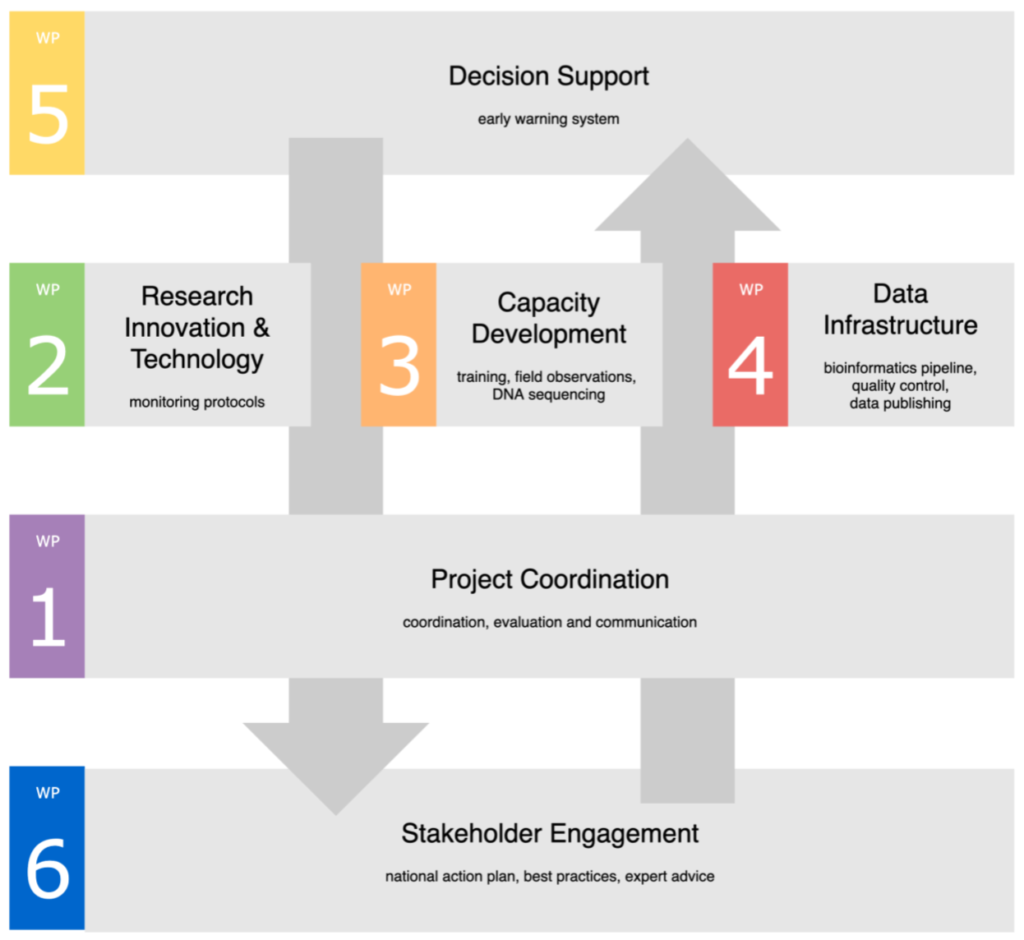Implementation strategy
The IOC Project Office in Oostende (Belgium) will be responsible for the overall coordination and implementation of the project (WP1), supported by a local project manager hosted at the University of the South Pacific. This will include (i) the organization of regular project meetings (advisory board, composed of scientific experts and government stakeholders), (ii) ensuring the timely delivery of progress reports and post regular news updates via a dedicated project website and social media channels (communication and outreach).
In the first phase of the project we will develop a national Bioinvasions Monitoring Plan for Fiji (WP2), based on a need’s assessment (via the advisory board) and a review of current best practices (ARMS protocol, OSPAR protocol, and others) in detecting invasive species. Different technologies for DNA sequencing will be compared. The plan will include the selection of the best candidate technologies, a detailed protocol on field sampling and sample processing as well as the list of targeted species (which will be updated based on newly recorded NIS in adjacent areas).
Based on the agreed monitoring plan, the project will first enter a testing phase where the proposed protocols are tested and optimized, and then continue into the operational phase (regular NIS monitoring) by first training local scientists in field sampling, sample processing, DNA sequencing and data management (WP3). This work will be organized by our partner USP in collaboration with the OceanTeacher Global Academy and its regional training centre (being at the secretariat of the Pacific Community SPC). Our South-West Pacific OBIS node hosted at NIWA (New Zealand) will assist in the training. Early on in the project (year 1), a more general OBIS train-the-trainers course will be developed and organized, also in collaboration with OceanTeacher Global Academy. This training will include the use of the newly developed data entry tool which will make it easier for (citizen) scientists to submit incidental observations of marine invasive species. USP will organize regular field campaigns.
By building on a number of existing initiatives, WP4 will create a bioinformatics pipeline in order to improve the availability of omics data, and more specifically metabarcoding data from biofouling communities, to global data infrastructures (OBIS) and preserve provenance with links to other repositories where standardized metadata (GEOME), sequence data (INSDC), and taxonomic information (WoRMS) are stored.
Based on the output data stored in OBIS, a decision-support tool (WP5) will provide observations in a user-friendly dashboard indicating potential presence of invasive species (including pathogens and pest species) or risk of invasions to support local management. Early warnings will be generated based on observations in nearby adjacent areas and will provide a service for local managers and decision makers to set up targeted monitoring programmes. The specific services of this decision-support tool will be discussed and selected in consultation with the advisory board.
Strong stakeholder engagement (WP6) will ensure the marine bioinvasions monitoring plan and the decision-support tool are owned by and meet the requirements of local management. The decision-support tool will be connected to a biofouling species knowledge hub (a deliverable of the GloFouling Partnerships project). The scientific information will also provide guidance and knowledge (especially on the dynamics and pathways) for a new UN interagency GESAMP biofouling management working group led by IOC-UNESCO. This GESAMP working group is tasked to provide recommendations and best practices to the Lead Participation Countries in the GloFouling Partnerships project on the management and prevention/reduction of biofouling NIS. Fiji is one of those 12 lead participating countries that have made commitments to establish national strategic action plans to manage biofouling. The Ministry of Environment in Fiji (which is the focal point for invasive species) will be a key stakeholder for this project. The Pacific Islands have adopted a regional strategy on shipping-related introduced marine pests through the Secretariat of the Pacific Regional Environment Programme (SPREP). So also SPREP, the International Maritime Organization (GloFouling Partnerships project) and the UN interagency GESAMP working group on biofouling are key stakeholders.
An element cutting across all the above-described WPs will be to promote further testing, application and communication on emerging technologies supporting research and observations, contributing to the overall goal of raising ocean literacy. This will be done through a web platform for sharing information, tools and best practices (stakeholder forum).
